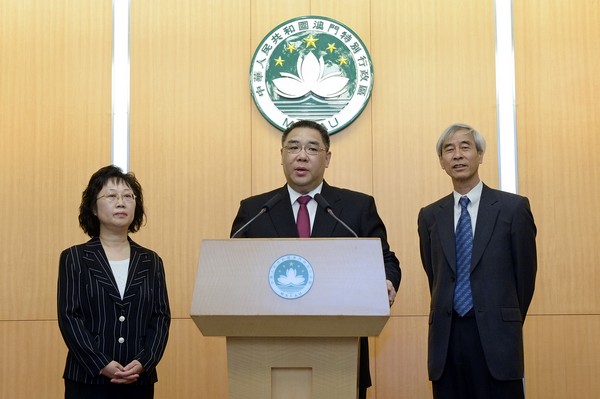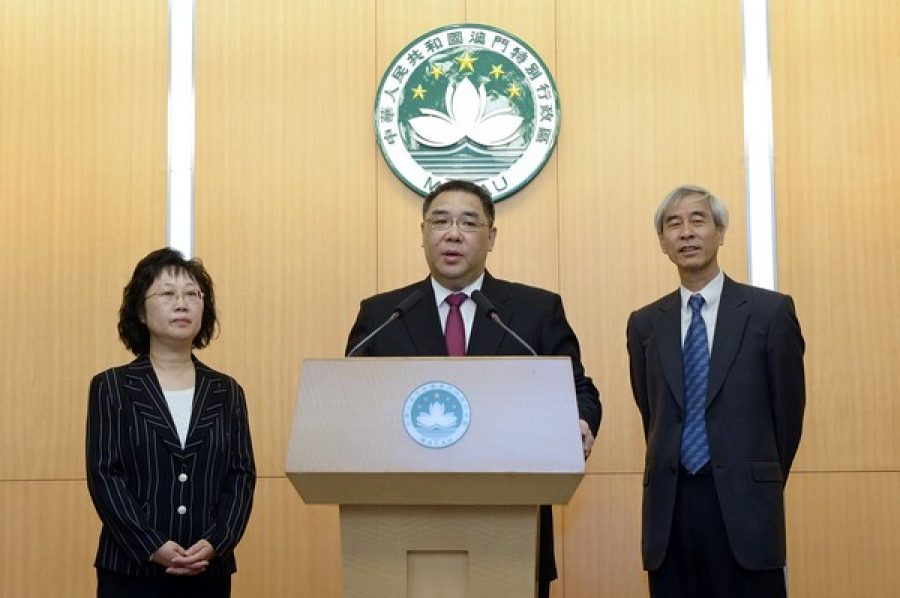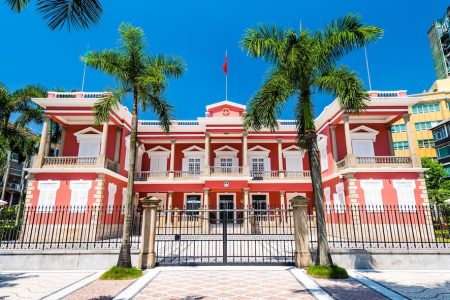After the city’s biggest protests since the 1999 handover, Chief Executive Fernando Chui Sai On announced Thursday at a special press conference that he had decided shelve his government’s controversial perks bill that, if passed by lawmakers as scheduled on Tuesday, would have given him and a few other principal officials lavish retirement packages in a city that still has no comprehensive retirement scheme for its population.
Announcing the U-turn at Government Headquarters, Chui promised that his government would consult the public in the near future on how to set up a system regulating the benefits which principal officials would receive upon leaving their posts.
Officially, the ill-fated bill proclaimed that it would regulate the chief executive’s and other principal officials’ “guarantees.”
Accompanied by Secretary for Administration and Justice Florinda Chan Lai Man and Executive Council (ExCo) spokesman Leong Heng Teng, Chui admitted that there were flaws in the government-drafted bill that brought thousands of protesters to the streets on Sunday and Tuesday.
Although he insisted on the need to attract qualified professionals from the private sector to work for the government, Chui indicated that this would not be the main point of focus when consulting the public on the controversy.
Chui also pledged that if a revised version of the bill was resubmitted it would pass through a public consultation process.
“We need to listen to people’s opinions in order to narrow the differences and form a consensus,” Chui said.
Commenting on allegations that he intended to benefit financially himself from the bill, Chui said that he had intended to donate the money he would have received to charity, adding he had contacted six entities already.
“To be honest, by the time the bill was submitted to the legislature, I had decided to donate the money that I would have received,” he said. “… I have been working in Macau for 30 years… and I see that there are many people who need help. So I had contacted six charitable and educational organisations so that if the system was set up, I wouldn’t benefit from it and I would have donated the money to them.”
“I am fat, but I don’t intend to gain weight [through the perks bill],” he continued, referring to public derision over the bill which many citizens had described as self-serving and tailor-made for Chui and his principal officials, some of whom are expected to leave their posts by the end of the year.
Chui also said that the government should establish more channels to gather opinions from young residents. “As the head of the government, I am often the target of critisism, which I think is an opportunity for us to reflect on the things that we haven’t done well,” he said.
Most of the protesters on Sunday and Tuesday were young people.
Responding to the criticism that the bill was tailor-made to save him from any legal consequences by proposing to grant him immunity from criminal litigation, the Chief Executive said that Chan had talked to the central government in 2007 about the issue, stressing it would not have given him more protection than central government leaders.
Chui said that the bill was not meant to protect himself from being investigated during his term. However, he was quick to add that “the door is open” when it comes to seeking public opinion on the matter.
Chui is widely expected to be re-elected as Chief Executive by a 400-member committee for a second and final term later in the summer.
The “golden handshake” bill, which mainly dealt with the benefits and retirement compensation packages for the chief executive and other principal officials once their term ends, stated that while the chief executive would be given criminal immunity during his tenure, the amount of compensation that the principal officials could get was to be calculated by taking a percentage – 14 percent for those who are civil servants and 30 percent for those who do not come from a civil servant background – of their monthly salary by the time they leave their posts, and multiply it by the number of months they were in their positions.
Apart from their generous one-off payments, during their first year of retirement from the government – when they are barred from taking up jobs in the private sector – the principal officials would also have received an additional payment worth 70 percent of their monthly salary.
The bill also proposed to pay former chief executives 70 percent of their salary for as long as he or she was unemployed. Chui earns about 270,000 patacas a month.
The outline of the bill was passed in its first reading on December 16 without much public reaction. But when the formula of calculating the top officials’ generous compensation packages came to light about a month ago, public opposition began to grow steadily, culminating in the record-breaking protest numbers on Sunday and Tuesday.
Chui initially reacted by proposing delaying the bill’s debate and final article-by-article on Tuesday, which saw nearly 7,000 people gathering on the patch of grass outside the legislature for a sit-in, where they demanded that Chui retract the bill once and for all. The legislature’s reacted by delaying the vote, but most lawmakers defended the bill and rejected a motion by fellow legislator Ng Kuok Cheong to shelve it.(macaunews/macaupost)






